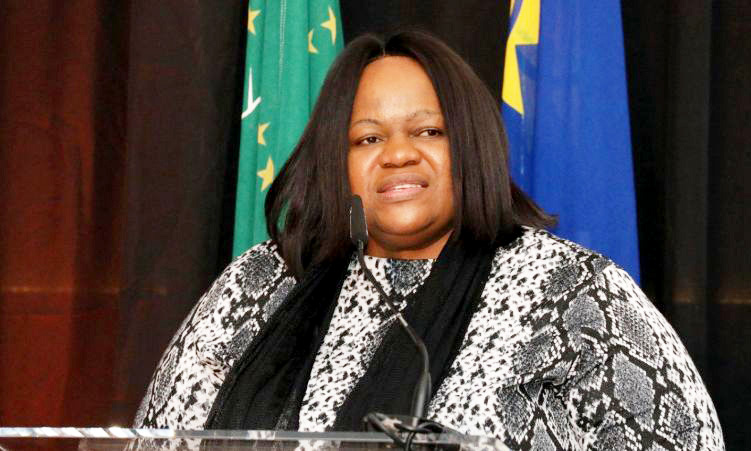The Ministry of Industrialisation and Trade has partnered with various stakeholders to train about 2 000 enterprenuers.
This was revealed at the official launch of the 2024 Empretec Namibia training last week.
Minister of industrialisation and trade Lucia Iipumbu said the training signifies the ministry’s commitment to fostering micro, small, and medium enterprise (MSME) development in Namibia.
“Our mandate traces its roots from the 1997 SME national policy and has evolved through the 2016 MSME national policy. Over the years, we have implemented various support programmes to bolster MSMEs in both the formal and informal sectors,” Iipumbu said.
Among the initiatives highlighted by Iipumbu were the Equipment Aid Scheme, Business Infrastructure Support Programme, Industrial Upgrading and Modernisation Programme (IUMP), Sustainable Development Goals (SDG) Impact Facility, and the collaborative venture with Empretec Namibia.
“The IUMP, established in 2012 as a national extension of the sub-regional IUMP for the Southern African Development Community, aims to improve the competitiveness of local industries, contribute to the strengthening of Namibian SMEs, diversify national value addition, enhance the capacities for job creation and support efforts to reduce poverty,” Iipumbu said.
She elaborated on the success of these programmes, citing interventions in sectors such as fish and food processing, agro-processing and value-added bush products, which have supported over 150 MSMEs since their inception.
The SDG Impact Facility, a collaborative effort with United Nations Development Programme (UNDP) Namibia, Standard Bank Namibia and the Environmental Investment Fund, was particularly focused on.
This initiative aims to support and fund sustainable social enterprises, addressing the persistent challenge of limited access to finance, hindering business development.
“Since 2021, we have funded over 95 enterprises under this facility and aim to grow the fund into an endowment fund with other interested partners,” Iipumbu said.
She also highlighted specific sectoral intervention, such as gemstone cutting and polishing training, which has empowered approximately 300 young people, with around 90% finding employment in the diamond polishing and cutting sector.
“The 2023 cohort has just graduated and out of 24 graduates, we can report that 22 are about to start their employment within the diamond cutting and polishing sector. We are about to advertise for the 2024 cohort to apply,” Iipumbu said.
Charcoal training sessions for MSMEs were emphasised as key to the development of the charcoal value chain.
Approximately 40 MSMEs have received training on sustainable charcoal production, enhancing human capacity development and technological know-how.
“The series of training sessions on sustainable charcoal production aims at empowering MSMEs with new skills and technology and equipment utilisation through practical sessions,” the minister said.
Acknowledging the significance of entrepreneurship in driving economic transformation, the minister discussed the StartUp Namibia programme.
“The ultimate aim is to incubate our start-ups until they reach a self-sustenance level. Later this year, we will launch StartUp Namibia at our facility at the Lafrenz industrial area in Windhoek,” she said.
Turning her attention back to Empretec Namibia, Iipumbu provided insights into the programme’s evolution since its approval by the Cabinet in 2019.
Despite the challenges posed by the Covid-19 pandemic, the initiative has been operational, having trained close to 2 000 entrepreneurs, with approximately 30% belonging to vulnerable categories.
“Today’s training is a roll-out of the much-vaunted Entrepreneurship Training Workshop (ETW), which is the standard training provided globally. Along with our partner Empretec Ghana, we aim to ensure that we complete needed trainings to train up to 180 trainees,” the minister said.
Alka Bhatia, the UNDP’s resident representative to Namibia, lauded the government’s investment in empowering the local private sector, emphasising the importance of resilience and collaboration for a productive economy.
“Namibia needs to accelerate its efforts towards transforming its economy and your contribution is key to the attainment of this goal!” Bhatia said, reaffirming UNDP’s commitment to supporting inclusive economies.
She said addressing poverty and achieving the SDGs by 2030 are urgent.
“Today’s world is rapidly changing, presenting complex and dynamic challenges that cannot be solved through traditional tools or methods.
“Up to one billion people could be living in extreme poverty by 2030, unless we seize the opportunity presented for a decisive push towards the SDGs,” Bhatia said.
Stay informed with The Namibian – your source for credible journalism. Get in-depth reporting and opinions for
only N$85 a month. Invest in journalism, invest in democracy –
Subscribe Now!






